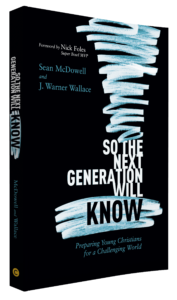
As someone who teaches regularly at a university and mentors students at Summit Worldview and Rethink Student Conferences, I’ve been sharing what I believe are the three most important “trajectory decisions” any graduate can make, even before they consider their first job offer:
Choosing the Right Worldview:
A “worldview” is “a mental model of reality – a comprehensive framework of ideas and attitudes about the world, ourselves, and life.” Our “mental model” of the world helps us answer the most important questions we face as humans: “How did we get here?”, “Why is the world so ‘broken’?”, “How can we fix it?”, and “What is the purpose of life?” These questions matter, and every young (or seasoned) graduate should take the time to consider their worldview prior to making any other decision.
Are we simply the product of unguided evolutionary processes and natural selection, or were we created for a purpose? Are moral truths merely a matter of opinion and cultural consensus, or are they grounded in the mind of a transcendent, objective, moral Being? Is meaning and purpose purely a matter of personal preference, or are there ultimate (and even eternal) consequences related to such choices? These kinds of questions (and the answers they elicit) help us lay the foundation for our decision making, even before we choose a career. They point us toward ourselves or toward our Creator. Choosing the right worldview is an important trajectory decision.
Choosing the Right Spouse:
I encourage young people to be as intentional about their selection of mate as they are about their selection of education or career. I’ve known many educated, accomplished professionals who were derailed by bad choices in their personal lives. On the other hand, I’ve also known many contented, happily married couples who were not particularly well educated nor successful as professionals. As a homicide detective, I’ve never heard anyone say they wish they had accomplished more at work or school when lying on their deathbed. Instead, they often lament missed opportunities with their family. When push comes to shove, relationships are more important than accomplishments.
Marriage is the most significant relationship we will ever have. Studies continue to find, for example, that married men are happier than single men, and married people are healthier, wealthier, and more satisfied. One study even found that married people have lower cortisol levels (a stress hormone), and therefore are less likely to have heart problems, decreased immunity, diabetes, or cancer. Married people are even more likely to survive cancer. Picking the right spouse is critical to marital success. The better the relationship between spouses, the happier and more satisfying the results. That’s why it’s important to identify and select your worldview before choosing a spouse who shares a similar view of the world.
Choosing the Right Mission:
I earned two degrees in fine arts and took a position at a local architectural firm prior to changing course and entering the police academy. I considered my position as an architect to be a career, but my position as a police officer to be a calling. The difference between these two ways of looking at employment was largely the product of how I saw the world and understood my place in it, and that’s why worldview choices ought to come before career choices.
As I began to rethink my understanding of the world around me, I embraced the notion that I had been created for a purpose and called to a vocation. Because I saw my vocation in this way, I was able to endure the difficulties I encountered as a police officer without becoming bitter or disillusioned. Underpaid? It didn’t matter, I didn’t become a police officer for the money. Difficult scheduling? No big deal, I knew important missions often required extraordinary sacrifice. Dangerous? Sure, but I embraced a view of life and mission that transcended my earthly existence. I didn’t choose a job or career when I decided to become a police officer (and ultimately a cold-case detective). Instead, I chose a mission that just happened to be served by my career choice.
Trajectory decisions are important, and they must be made early. If you’re guiding a rocket to the moon, a two-degree mistake a mile from the destination won’t cause you to miss the landing pad by much, but a two degree mistake a mile from your starting point will cause you to miss the moon by thousands of miles. That’s why it’s important for every graduate to make wise decisions early, especially when they are related to worldview, marriage and mission.
This article first appeared on FoxNews.com

J. Warner Wallace is a Dateline featured Cold-Case Detective, Senior Fellow at the Colson Center for Christian Worldview, Adj. Professor of Christian Apologetics at Talbot School of Theology, Biola University, author of Cold-Case Christianity, God’s Crime Scene, and Forensic Faith, and creator of the Case Makers Academy for kids.
Subscribe to J. Warner’s Daily Email
J. Warner Wallace is a Dateline featured cold-case homicide detective, popular national speaker and best-selling author. He continues to consult on cold-case investigations while serving as a Senior Fellow at the Colson Center for Christian Worldview. He is also an Adj. Professor of Christian Apologetics at Talbot School of Theology, Biola University, and a faculty member at Summit Ministries. He holds a BA in Design (from CSULB), an MA in Architecture (from UCLA), and an MA in Theological Studies (from Gateway Seminary).






































